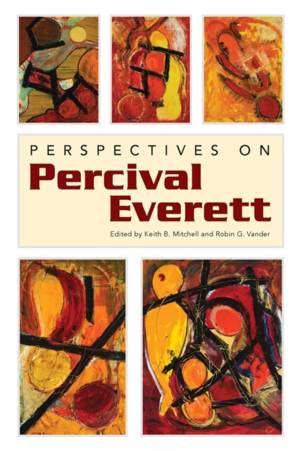
- Afhalen na 1 uur in een winkel met voorraad
- Gratis thuislevering in België vanaf € 30
- Ruim aanbod met 7 miljoen producten
- Afhalen na 1 uur in een winkel met voorraad
- Gratis thuislevering in België vanaf € 30
- Ruim aanbod met 7 miljoen producten
Zoeken
Perspectives on Percival Everett
€ 50,95
+ 101 punten
Omschrijving
Essays by Uzzie Cannon, Jonathan Dittman, Ronald Dorris, Frédérick Dumas, Sarah Mantilla, Richard Schur, Anthony Stewart, Robin G. Vander, and Sarah Wyman Percival Everett (b. 1956) writes novels, short stories, poetry, and essays, and is one of the most prolific, acclaimed, yet underexamined African American writers working today. Although to date Everett has published eighteen novels, three collections of short fiction, three poetry collections, and one children's book, his work has not garnered the critical attention that it deserves. Perhaps one of the most vexing problems scholars have had in trying to situate Everett's work is that they have found it difficult to place him and his work within a prescribed African American literary tradition. Because he happens to be African American, critics have expectations of so-called authentic African American fiction; however, his work often thwarts these expectations. In Perspectives on Percival Everett, scholars engage all of his creative production. On the one hand, Everett is an African American novelist. On the other hand, he pursues subject matters that seemingly have little to do with African American culture. The operative word here is "seemingly"; for as these essays demonstrate, Everett's works fall well within as well as outside of what most critics would deem the African American literary tradition. These essays examine issues of identity, authenticity, and semiotics, in addition to postmodernism and African American and American literary traditions--issues essential to understanding his aesthetic and political concerns.
Specificaties
Betrokkenen
- Uitgeverij:
Inhoud
- Aantal bladzijden:
- 256
- Taal:
- Engels
- Reeks:
Eigenschappen
- Productcode (EAN):
- 9781628460599
- Verschijningsdatum:
- 12/02/2014
- Uitvoering:
- Paperback
- Formaat:
- Trade paperback (VS)
- Afmetingen:
- 152 mm x 229 mm
- Gewicht:
- 281 g

Alleen bij Standaard Boekhandel
+ 101 punten op je klantenkaart van Standaard Boekhandel
Beoordelingen
We publiceren alleen reviews die voldoen aan de voorwaarden voor reviews. Bekijk onze voorwaarden voor reviews.







